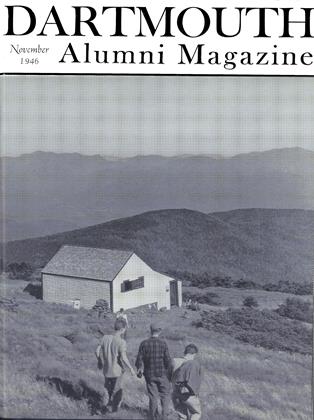President Dickey, Opening the College's 178th Year, Tells Students World's Troubles Are Also Theirs
GENTLEMEN OF THE COLLEGE:
I shall speak to you this morning both very briefly and very informally. These occasions are often used—whether effectively I cannot yet say—both to introduce men to the glories of college and to tell them of the world's troubles which fortunately, as it is usually put, are not yet theirs.
Most of you have already had some firsthand experience with the world's troubles. You undoubtedly hold with varying degrees of certainty different views as to just what that experience did teach you. I have neither the qualifications nor the desire to stand before you and to assert that the war ought to have taught you something other than you think it did. But I am going to suggest that you remember this: experience like all other teachers does its teaching within a context and there is always some measure of distortion in any context whether it be in the training camp, in battle or in the classroom. The good teacher seeks always either to reduce that distortion or to make you aware of it. But experience is not so considerate; she is neither trained nor paid to teach, she just teaches. And whether she is a good teacher, let alone the best as some have said, depends almost solely on your ability to understand the context and to reduce the distortion of the particular experience for yourself. It is hard to do that while you are sweating, swearing or fighting it out. But a calmer moment always comes in life and, Gentlemen, it is out of those calmer moments that comes such understanding and wisdom as a man gets. Learning to spot those moments and to use them is a large part of any man's education. Need I sharpen that point further?
But I would like to say just a word more about the world's troubles and your relation to them. I hope that whatever else you have already learned in war or may learn here in peace that when the time comes you will leave college understanding two things about the world:
First, that the world's troubles are your troubles even though the converse may often seem to you not to be true; and
Secondly, that the world's worst troubles come from within men and there is nothing wrong with the world that better human beings cannot fix.
Gentlemen, if you leave Dartmouth without a deeper understanding of those two propositions than you now have, you and the College will have failed each other and there will be a default, a serious default, in the College's first obligation to human society.
And now as to the glory of being in college. I fear that anything I might say on that side of the subject would be neither long remembered nor of much immediate help to you. What I might say about your good fortune in being at Dartmouth might seem vain to outsiders and as for yourselves if you have it in you to take, in reasonably full measure, what is here for the taking, you will soon be either for the first time or once again a part of Dartmouth, and being a part of her you will know her full well for yourself. Many of you have already known something of Dartmouth in wartime, either as civilians or as members of the naval unit. To say that you are welcome back is to mask with words an emotion of rejoicing which is deeper than men easily know or freely admit. It is closely akin to that feeling we all know for those nearly 300 former Dartmouth colleagues of yours who are not returning now or later because they were called to honor man's highest priority.
Gentlemen, as I have said once before, as members of the College you have three different but closely intertwined roles to play:
First, you are citizens of a community and are expected to act as such.
Second, you are the organic stuff of an institution and what you are it will be.
Thirdly, your business here is learning and that is up to you.
We'll be with you and "Good Luck!"
A FULL HOUSE, with students sitting in the aisles, standing in the balconies, and clogging the stairways, heard President Dickey speak at the Webster Hall exercises opening the College's 178 th year.
 View Full Issue
View Full Issue
More From This Issue
-
 Article
Article"JEFF" TESREAU
November 1946 By EDWARD JEREMIAH '30 -
 Article
ArticleADVOCATE OF PLENTY
November 1946 By JAMES L. FARLEY '42 -
 Article
ArticleWar Story of Jiggs Donahue '15
November 1946 By James L. Farley '42 -
 Class Notes
Class Notes1917
November 1946 By MOTT D. BROWN, DONALD BROOKS -
 Article
ArticleAnnual Financial Report
November 1946 -
 Article
Article188 Sons of Alumni Among Entering Students This Fall
November 1946
Article
-
 Article
ArticleOUTING CLUB BUSINESS MEETING
-
 Article
ArticleWith the Big Green Teams
JANUARY 1968 -
 Article
ArticleDartmouth Ski Memorabilia Sought for National Museums
JUNE 1969 -
 Article
ArticleThe dancing was different, the party lingers on
APRIL 1978 -
 Article
ArticleWinter: Zum, Zum, Zum...An Omnibus
December 1992 -
 Article
ArticleTuck School
MAY 1957 By R.S. BURGER


